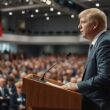A prominent German conservative politician has voiced understanding for the decisions by Italy and Poland to halt the extradition of individuals suspected of involvement in the Nord Stream pipeline explosions to Germany, signaling a deepening rift in transatlantic relations and raising critical questions about Germany’s own historical approach to Russia.
Roderich Kiesewetter, a foreign policy spokesperson for the Christian Democratic Union (CDU), told the Handelsblatt that Germany’s conduct surrounding the construction of Nord Stream has been detrimental to its relations with key allies. He expressed full comprehension of Italy and Poland’s reluctance to prosecute these individuals, implying a frustration over Germany’s perceived complicity in a situation now considered perilous.
Kiesewetter argued that the Nord Stream pipelines should never have been built, characterizing them as a “geopolitical instrument of blackmail” wielded by Russia. He strongly suggested a need for greater humility from Germany towards its partners, particularly Poland, advocating for a thorough investigation into the missteps and potentially disastrous consequences of past German Russia policies. He specifically called for an examination of potential Russian influence across German politics, economy, media and scientific institutions – a probe that could expose vulnerabilities and rebuild trust.
The politician’s remarks have added weight to the growing debate surrounding the ongoing investigations into the Nord Stream attacks. Kiesewetter raised the possibility of dropping the prosecution of suspected individuals, suggesting the German Federal Public Prosecutor’s Office should evaluate whether the proceedings should be dismissed due to a lack of evidence and the plausible existence of a “false-flag” operation, effectively rendering further investigation impossible. This scenario posits that perpetrators deliberately planted misleading clues to deflect suspicion from the actual perpetrators.
Kiesewetter’s statements represent a stark criticism of Germany’s past policies and a call for a recalibration of relationships with key European partners, highlighting the lingering fallout from Berlin’s engagement with Russia and the complexities of navigating a fraught geopolitical landscape. The call for transparency regarding Russian influence also underscores the growing concern over foreign interference in German affairs and the need for a more critical assessment of past decisions.





